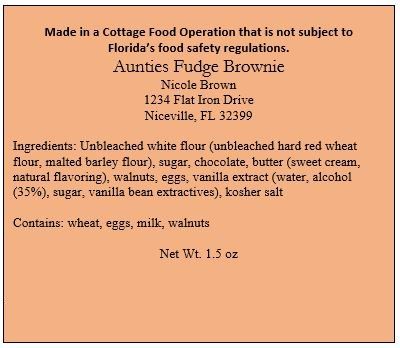This document is one in a "Florida Food Entrepreneur" series, which seeks to assist new and established food entrepreneurs by providing information on topics relevant to food-based businesses.
In Florida, individuals can manufacture, sell, and store specific types of cottage food products in their primary home kitchen in accordance with Florida Statute 500.80. Cottage food operators are not required to obtain a license or permit, and these operations are not inspected by any state government entity.
Sales and Marketing
On July 1, 2021, a senate bill known as the “Home Sweet Home Act” took effect and amended previous cottage food requirements in Florida. Cottage food businesses are now limited to $250,000 in gross sales, annually. Cottage food operations may sell, offer for sale, and accept payment over the internet or by mail order. Products may be delivered in person directly to the consumer, to a specific event venue, or shipped across state lines by the United States Postal Service or commercial mail delivery service. Products may be sold at farmer’s markets, pop-up markets, flea markets, and roadside stands (provided there are no other food items at the stand that require a food permit). Cottage food products may not be sold, offered for sale, or delivered for consignment or wholesale.
Allowable Foods
Foods manufactured under the cottage food law are limited to products that are considered a low risk for causing foodborne illness. Many products are not allowed to be manufactured under the cottage food law because they require time/temperature control for food safety to limit pathogenic microorganism growth or toxin formation. Examples of products allowed and prohibited to be sold as cottage foods are found in Table 1.
Labeling Requirements
Cottage food operators may only sell allowed products that are prepackaged and labeled for individual sale. The affixed product label is required to include the following information:
- Name and physical address of the cottage food operation
- Name of the product
- Ingredient list for the product in descending order by weight
- Net weight or net volume of the product
- Allergen information as required by federal law
- Must identify if any of the following are in the product:
- Milk
- Eggs
- Wheat
- Peanuts
- Soybeans
- Fish (including shellfish, lobster, crab, or shrimp)
- Tree nuts (almonds, pecans, walnuts, etc.)
- Must identify if any of the following are in the product:
- Cottage food operation statement printed in at least 10-point font in a contrasting color to the label background: "Made in a cottage food operation that is not subject to Florida's food safety regulations."

Frequently Asked Questions
Do I need to apply for a local business tax account or home occupational license as a cottage food operator?
Anyone wishing to start a food-related business should contact their local tax collector and inquire as to whether they need to collect taxes. While many food and grocery items are exempt from tax, some food products are not tax exempt.
What happens if someone files a complaint against me?
Even though cottage food operations are not inspected by any state government entity, if a complaint is received, the Florida Department of Agriculture and Consumer Sciences (FDACS) will investigate. Furthermore, if FDACS finds the operation is in violation, the operation may be fined.
Can I make pumpkin butter?
No. Pumpkin butter is considered a potentially hazardous food because it is a low-acid food that may support the growth of harmful bacteria and cause a foodborne illness.
Can I make pet food or treats?
No. The cottage food law only applies to human food. Pet food is regulated by state and federal laws.
My friend has a cottage food business, but my wedding venue requires all vendors to have a food license. Can a venue or market require a license?
Yes. Even though the entity may meet the requirements of a cottage food operation, some venues or other direct sales markets may require vendors to have additional licensing or food protection manager's certification.
Can I sell my cottage food products from a convenience store?
No. A permitted commercial food establishment or mobile food vendor cannot sell foods from an unapproved source, including cottage foods.
Can my county or city prevent or restrict me from having a cottage food operation?
No. The state regulates cottage food operations. A local law, ordinance, or regulation may not prohibit a cottage food operation or regulate the preparation, processing, storage, and sale of cottage food products by a cottage food operation or from a person's residence. However, a cottage food operation must comply with all applicable county and municipal laws and ordinances regulating traffic, parking, noise, signage, and hours of retail operation.
Can I grow my own produce, such as pumpkins, to can and use them later for baked goods?
No. Home-canned products cannot be used. Commercially processed canned fillings such as canned pumpkin must be used.
Can I use homegrown fruits and vegetables in baked goods?
Yes. You should take care to thoroughly wash the homegrown produce and the fruits or vegetables must be incorporated into the batter and properly baked, labeled and packaged. The baked goods may not be decorated or garnished with fresh fruits or vegetables.
Further Resources
Florida Department of Agriculture and Consumer Services (FDACS) Cottage Food Operations Guidance: https://www.fdacs.gov/content/download/70108/file/Cottage-Food-Brochure.pdf
Florida Statute 500.80 (Cottage Food Operations): http://www.leg.state.fl.us/statutes/index.cfm?App_mode=Display_Statute&URL=0500-0599/0500/Sections/0500.80.html
“Home Sweet Home Act”: https://www.flsenate.gov/Session/Bill/2021/1294/BillText/c1/PDF